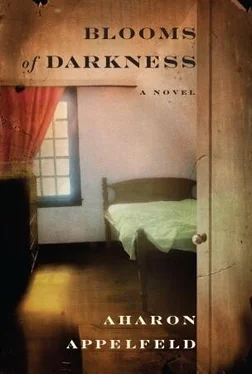Another life , he says to himself, and doesn’t know what he is saying.
After they took his tonsils out, he hadn’t known what was taken from his body and how many days he would have to suffer from pain. The people around him, two nurses and a doctor, looked to him like severe and cruel creatures. His mother and father stood behind them helplessly. They looked at him with eyes full of mercy, as though saying to Hugo, You aren’t alone. We’ll protect you with all our strength. In a little while the medical team will leave you, and you’ll come back to us. We know, it’s not an easy experience, but in a few days it will all pass, and you’ll be with us, as always .
Hugo sees his parents very clearly. The distant past that hides within him removes its veils and stands before him, face-to-face. He is sad that he has been separated from his loving parents and that he has to lie under the cold and stinking sheepskins.
While he is sunk in that frightening vision, Hugo hears a voice in Mariana’s room. It is the voice of a man who isn’t satisfied and who expresses his dissatisfaction with blunt words. The man speaks in German, but a German different from his. Hugo doesn’t understand most of the words. At first it amuses him to eavesdrop, but as the disagreements grow stronger, a clear threat is heard in the man’s voice.
Mariana, whose voice he definitely recognized, tries to mollify the man, but he sticks to his opinion. In the end Mariana says a few things that make him laugh. The differences of opinion die down, and there are whispers that Hugo can barely catch.
Sleep has been stolen from him. He is awake, with an alertness that grows steadily sharper. Sounds of scraping come from Mariana’s room, as though they are trying to move a heavy piece of furniture. The sounds of movement intensify, and it is clear that the words have stopped and only the unseen movements are doing what they are doing.
Then he hears Mariana say, “If I’m not what you want, you can pick another woman. I’m not the only girl in this house.” Hugo doesn’t catch the man’s answer. They argue, but there isn’t any anger. In the end he hears the man say, “You know very well what my conditions are.”
“I try, but I don’t always manage.”
“That’s your problem.”
“I’ve always drunk, and you just started complaining recently.”
“Because you overdo it. A drunken woman is a damaged woman.”
“You’re wrong. A drunken woman is a woman liberated from all restraints, who knows how to love right.”
“I don’t like it when people mix things up. Drinking is one thing and love is another.”
“And I actually think that it’s a good idea to mix them. Love without a drink is dull love, full of inhibitions and tasteless.”
“I understand you,” he says, but it is clear that he doesn’t agree with her.
“What can you do? That’s how I am. It’s clear I won’t change.”
Though he is tired, Hugo catches the whole conversation. The words “drunk” and “brandy” are no strangers to him. His uncle Sigmund, his mother’s brother, was addicted to brandy, and in Hugo’s house that subject was constantly discussed. Hugo loved his uncle even when he was drunk. When he came to their house drunk, his mother kept Hugo out of the living room and ordered him to go up to his room. Uncle Sigmund was a happy drunk. He would joke about his drunkenness and make everyone laugh. Only Hugo’s mother wouldn’t laugh. Sigmund’s drunkenness made her sad, and sometimes she would cry.
Meanwhile, Hugo falls asleep.
In his dream he is with his parents, and they are swimming in the Prut River. Suddenly Uncle Sigmund appears, and he is drunk and dirty. His mother, in her despair, tries to hide the shameful sight from Hugo. Because her hands can’t do it, she throws a big bath towel over his head, and it covers him completely. Hugo is suffocating and tries to throw the towel off, but his mother tightens it with both hands and refuses to heed his shout. Then her hands weaken, and Hugo falls into the waters of the Prut, which suddenly change color and become black and sticky.
His mother grabs him with both hands and picks him up, shouting, “The boy has drowned, the boy has drowned, help!” Because of the suffocation, or perhaps because of the scream, Hugo wakes from the nightmare.
The first morning light filters into the closet. From Mariana’s room merry voices can now be heard, as if Mariana and a man were rolling around in the bed, throwing pillows at each other. Clearly this isn’t the same man who grumbled before. This is a cheerful man, who is amusing Mariana.
“You’re funny,” she keeps saying.
“I don’t mean to make you laugh.”
“But you do make me laugh. You’re good to me.”
“I’m going to eat some of you.”
“And I’ll eat some of you, too.”
The laughter grows stronger, and it is obvious they are happy with each other.
Later he hears the man’s voice. “It’s late. I have to go.”
“And when will you come back?” she asks right away.
“I don’t know. My unit is going north.”
“If you come back here, don’t forget me.”
“Of course not.”
“I was good to you, right?”
“Excellent.”
After a short silence the man says, “They’re probably sending my unit to the front.”
“I hope not,” says Mariana.
“Pray for me that I won’t be wounded. Better to die than be wounded. A wounded man is as good as dead. I’ve taken care of a lot of wounded men.”
“I’ll pray, I promise you.”
“Do you go to church?”
“Sometimes.”
“My whole name is Johann Sebastian. My parents named me after the famous composer. They hoped I would become a musician.”
“I’ll pray, I promise.”
“Is that a strange request?”
“No, why?”
“I’ve seen too many wounded men in the past two years.”
“Don’t be scared, dear.”
“I’m not afraid of death. I’m afraid of being wounded.” He leaves, and Mariana leaves right after him. The silence returns.
Hugo lays his head on the sheepskins and says to himself, Strange things happen here. I don’t understand a thing . He closes his eyes, and again Uncle Sigmund appears to him. Because of his alcoholism, Uncle Sigmund never finished his medical studies. He kept promising his sister that he would soon dry out and return to them. That went on for years.
Not only was his drinking shameful. Sometimes he would bring a woman with him, usually from the lower classes, who was also addicted to drink. She would cling to him, hugging and kissing him in front of everybody and declaring, “Sigmund is a prince. Sigmund is a king.” Seeing such a woman, Hugo’s mother’s eyes would turn saffron yellow. His father was less sensitive, and during Uncle Sigmund’s strange appearances, he would sit and talk with him, sometimes for hours, about medicine and literature. Hugo didn’t understand a thing from those conversations, but he enjoyed watching the men. Even then he would say to himself, Everything I see, I’ll lock up in my heart . The thought that life passes by and that the dead will not come back to life pained him even then.
Hugo has apparently been forgotten, because it is ten o’clock before Mariana stands at the closet door with a cup of milk in her hand.
“How’s Mariana’s sweet little puppy?”
“He’s okay.” Hugo is drawn into her way of speaking.
“Soon Mariana is going to tidy up the room and you can move over into it. Mariana won’t sleep this morning. She has to go to town and buy some things for herself. You can amuse yourself quietly.”
“Thank you.”
“Why do you say thank you for everything? Mariana’s not used to being thanked. You only have to say thank you for big things.”
Читать дальше












